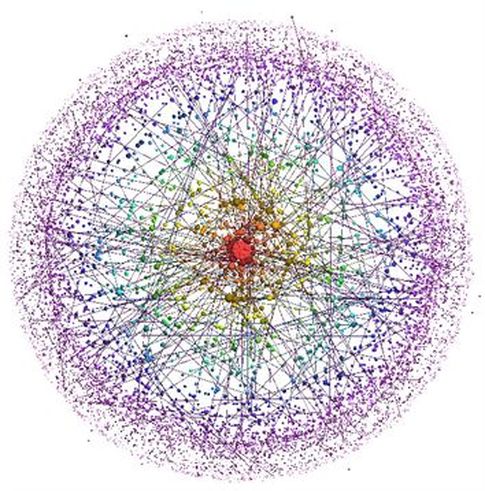I think that our ability to understand reality is hampered by what we can see with our own eyes. We are created to understand that which we can see and touch.
It is hard to understand things which we cannot count with our eyes, such as grains of sand on the see, number of ants, and how many drops of rain fall from the sky. We never developed that capability because it wasn't important to our survival. It just didn't matter to us, so we didn't need to understand or count all of them.
It is hard to understand the relationship of the world around us. It is easy to understand a basic structure such as food chain. Deer eats grass and man eats deer. But what about all of the intricacies that occur over time that are not as visible? How does the soil get fertilized and grow? How do the micro-organisms in the deer's stomach help digest food? Each of these is easy to understand on a singular basis, but when we accumulate how insects, dirt, mammals, fish, birds and humans interact we can no longer comprehend. We know that there is an entire ecosystem- but we don't do a good job of understanding it.
So, in order to cope we simplify things. We think that if we understand how the food chain works, then we understand the ecosystem. If we can count ten things, then 100 trillion must be just a larger number. We've each met hundreds or thousands of people in our lifetime, so maybe we understand how the rest of the world thinks and behaves.
There is a quote I love from Will Rogers "It isn't what we don't know that gives us trouble, it's what we know that ain't so"
When we simplify down our environment and create either or scenarios, it may help us feel comfortable, but doesn't mean that we really understand reality. Everything is connected and everything is much more complex than what you could imagine.
What is the solution? Some advocate trusting your gut, where you can unconsciously aggregate information and make a decision. Today, we are able to aggregate data and then test and see the reactions.While we are only moving one variable- we can see the real time effects on all the other variables. Capture as much data as possible and track the trends over time. We can process now trillions of pieces of information. Much more than we are able to track in our gut or in an excel spreadsheet.
It is hard to understand things which we cannot count with our eyes, such as grains of sand on the see, number of ants, and how many drops of rain fall from the sky. We never developed that capability because it wasn't important to our survival. It just didn't matter to us, so we didn't need to understand or count all of them.
It is hard to understand the relationship of the world around us. It is easy to understand a basic structure such as food chain. Deer eats grass and man eats deer. But what about all of the intricacies that occur over time that are not as visible? How does the soil get fertilized and grow? How do the micro-organisms in the deer's stomach help digest food? Each of these is easy to understand on a singular basis, but when we accumulate how insects, dirt, mammals, fish, birds and humans interact we can no longer comprehend. We know that there is an entire ecosystem- but we don't do a good job of understanding it.
So, in order to cope we simplify things. We think that if we understand how the food chain works, then we understand the ecosystem. If we can count ten things, then 100 trillion must be just a larger number. We've each met hundreds or thousands of people in our lifetime, so maybe we understand how the rest of the world thinks and behaves.
There is a quote I love from Will Rogers "It isn't what we don't know that gives us trouble, it's what we know that ain't so"
When we simplify down our environment and create either or scenarios, it may help us feel comfortable, but doesn't mean that we really understand reality. Everything is connected and everything is much more complex than what you could imagine.
What is the solution? Some advocate trusting your gut, where you can unconsciously aggregate information and make a decision. Today, we are able to aggregate data and then test and see the reactions.While we are only moving one variable- we can see the real time effects on all the other variables. Capture as much data as possible and track the trends over time. We can process now trillions of pieces of information. Much more than we are able to track in our gut or in an excel spreadsheet.



